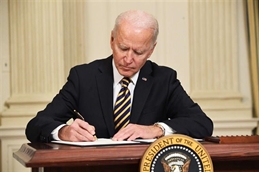
US President Joe Biden has signed an executive order (EO) pushing for a review of global supply chains in a bid to build the country's resilience to shortages in the wake of the coronavirus pandemic by boosting local productions of critical goods.
Biden cited four industries targeted under the mandated review: semiconductors, rare earth, advanced batteries and pharmaceuticals.
"The American people should never face shortages in the goods and services they rely on, whether that’s their car or their prescription medicines or the food at the local grocery store," Biden said on February 24.
Citing shortages in semiconductors and PPEs last year due to disruptions in the supply chains due to COVID-19 related restrictions, Biden said the US should look into building the country's own production capabilities and reducing its dependence on foreign countries for these critical supplies.
"That should never have never happened. And this will never happen again in the United States, period. We shouldn’t have to rely on a foreign country — especially one that doesn’t share our interests or our values — in order to protect and provide our people during a national emergency," Biden said.
"This is about making sure that the United States can meet every challenge we face in this new era ... The best way to do that is by protecting and sharpening America's competitive edge by investing here at home."
Biden's two executive orders
The American president signed two orders — one, calling for a 100-day review to assess vulnerabilities and areas for improvement of supply chains for four areas: pharmaceuticals, rare earth minerals, semiconductor chips and large-capacity batteries.
He also called for a separate, year-long review of six broader supply chains: defense, public health, communications technology, energy, transportation and food production.
Biden stressed that his orders are meant to build resilience by "identifying possible points of vulnerabilities in our supply chains" and making sure "we have the backup alternatives or workarounds in place."
"We all recognize that the particular problem will not be solved immediately. In the meantime, we are reaching out to our allies, semiconductor companies and others in the supply chain, to ramp up production to help us resolve the bottlenecks now," Biden said.
"We need to stop playing catchup."
The US President noted that this could mean working closely with "trusted friends and partners, nations that share our values so that our supply chains can’t be used against us as leverage" or "increasing our production here at home."
US Chamber supports Biden's move
In a separate statement, the US Chamber of Commerce expressed support for Biden's orders — also stressing that the US "should never suffer from shortages of essential goods due to supply chain issues."
“The US Chamber welcomes the Biden administration’s focus on US supply chain resiliency and we look forward to providing input on the administration’s supply chain executive order. The American public should never suffer from shortages of essential goods due to supply chain issues. We can mitigate risks to our supply chains by working with key international partners to diversify our supply chains and stockpiling select products," the chamber's Senior Vice President for Cyber, Intelligence, and Supply Chain Security Policy Christopher D. Roberti said.
"We trust that the administration will engage closely with the private sector to ensure that any policy recommendations reject punitive approaches, new trade barriers, and one-size-fits-all solutions,” he added.



